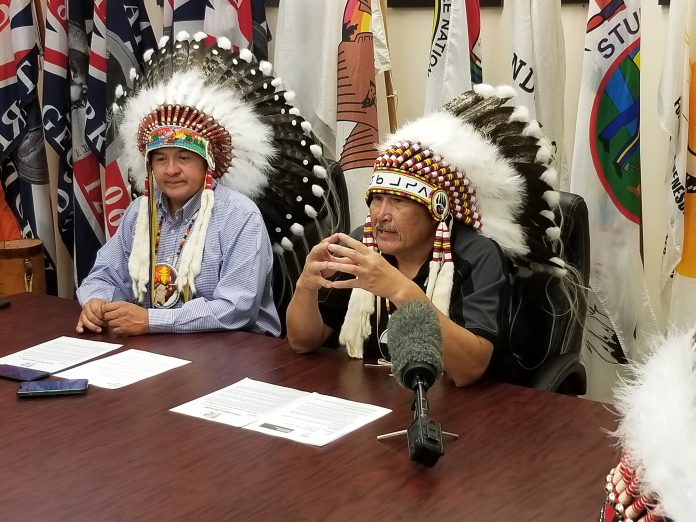
Prince Albert Grand Council (PAGC) Grand Chief Brian Hardlotte and FSIN Chief Bobby Cameron joined other PAGC chiefs in calling on both the provincial and federal government to reaffirm the treaty right to tax exemption.
Hardlotte and Cameron called for an exemption on Treaty Status Indigenous residents and bands paying the GST, PST, and Carbon Tax during a press conference on Wednesday. The call is in response to a Chiefs-in-Assembly resolution from February.
“The tax exemption is a small concession compared with the massive wealth amassed this century on the land taken from First Nations,” Hardlotte said.
“The governments came and took those lands, took what’s underneath: those natural resources… The impact of illegal taxation has been significant, burdening our communities and violating our rights.”
Hardlotte said tax exemption was guaranteed in treaties signed with the Crown between 1871 and 1906. He said in Ottawa, Indigenous people can present a status card at receive a tax exemption, but the practice is not widespread.
In Saskatchewan, residents who have Treaty Status were not required to pay the PST on items bought off-reserve until 2000, when the province made the change under Roy Romanow.
In Canada, Status Indians do not pay GST on services performed or purchases made entirely on a reserve, but otherwise are required to do so. For example, a piece of property purchased on reserve is not subject to GST, but a similar property purchased off reserve is.
“This is a long-standing issue and it’s about time,” Hardlotte said. “Getting the direction from our past elders, the time is now for both levels of government to follow what is said in that treaty and that’s to be tax exempted in all areas.”
FSIN Chief Bobby Cameron said he will suggest that the Prime Minister Justin Trudeau contact Gov. General Mary Simon on this issue so they can make their case before King Charles. Cameron said that’s appropriate, since the treaties were signed with the Crown, and not the provincial and federal governments.
Cameron said if they do not get a meeting, they will file a statement of claim and fight the matter in court.
“It’s been a long-time coming,” Cameron said. “This is what our ancestors wanted the FSIN to do. This is what we’ll continue to do. It’s our passion (and) it’s our life, promoting and implementing our inherent treaty rights.”
Cameron said, this is just one of many issues where the government have impacted and infringed on the treaty rights and many other Infringements on the treaty rates across the treaty territories.
“No government shall or must infringe or impact our treaty rights, nor can they force taxes, so we’re going to go the distance on this for as long as it takes, because this is a treaty battle that many of us have agreed to advocate for as elected leaders,” Cameron said. “It’s important.”
The Daily Herald reached out to the provincial and federal governments for a response to the FSIN and PAGC’s concerns. The federal government acknowledged receiving the request, but did not provide a response by press time.
In an email, a spokesperson for the provincial government wrote that all Saskatchewan residents benefited from health, education, and public safety programs and services funded by tax dollars, and the province had no plans to change the tax status for any Saskatchewan resident.
“Off-reserve purchases that are delivered to a reserve by a retailer and on-reserve purchases are already exempt from PST when purchased by a Status Indian who presents a valid Certificate of Indian Status Identification Card,” reads the email. “Our Government is committed to supporting all Saskatchewan residents, including First Nations, as we continue to deliver more than $2 billion in affordability measures each and every year. When taxes, utilities and housing costs are combined, our province is the most affordable place to live in Canada for a family of four.”
editorial@paherald.sk.ca

